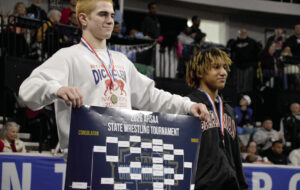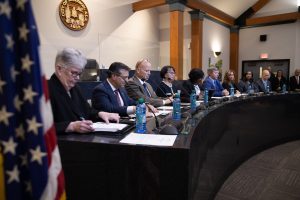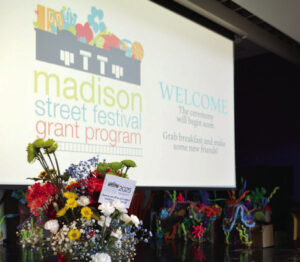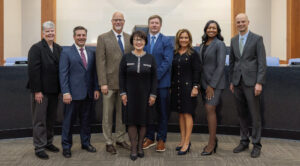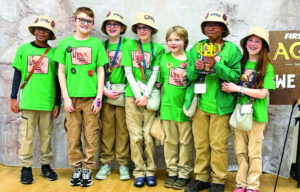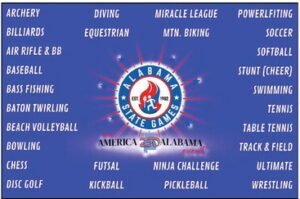Thurston accepts honor in Missouri
BY LORETTA GILLESPIE
During the war years, Jan Thurston held down the fort with two little ones, and one on the way. Thurston was in-country when the news came. He was the father of another little girl.
“I was assigned to a Calvary unit,” he said. “We lost a lot of people. It was hard to sit down and write those letters to wives and parents. I don’t know that you ever get used to it. It’s one thing when you go out and lead a mission – that’s okay- but when you send them out and stay behind, knowing that some may not come back, that’s hard.”
He was there during the infamous Tet Offensive, in January of ’68. He was in Command Headquarters when bombs blasted the building.
“We were defended by clerks, accountants and mechanics, who were really brave soldiers,” Thurston said.
Reassigned to the Armed Forces Staff College, Norfolk, VA in 1969, he learned Joint Operations, and became a Joint Staff Officer, assigned to the Pentagon as a personnel officer.
Later he served a third tour in Vietnam with the 101st Airborne Division, overseeing all aviation assignments in Vietnam. “At one time there were 35,000 aviation personnel in Vietnam,” he said. “I sent a lot of them home. Within six months we were down to 4500.”
With that action, he undoubtedly saved many lives.
Once he was home again, he packed up his family in the station wagon and moved to Washington state. He was assigned as an Executive Officer in the Air Defense Battalion of the 9th Infantry.
Assigned to the Pentagon, Thurston attended The Air War College in Montgomery, and returned to Germany (this time with his growing family, having added another son, Joseph in 1972) as the Air Defense Operations Officer for the United States Army in Europe.
He served as Chief of Staff for the 32nd Air Defense and was Commander of the 94th Air Defense Artillery Brigade, with eight battalions.
Another stint at the Pentagon led to his being assigned to the Space Command Center in Colorado Springs, where he was the first Commander of the US Army Space Command, in charge of planning for the ground base of America’s Missile Defense.
“All the first group of astronauts transferred there. Then I got to hand-pick the next group.”
“I had a lot of fun, met some wonderful people, and went around talking to college kids about what a great career the Army Space Program was,” he smiled.
Thurston retired from active duty in 1989, after 30 years of service to his country.
He went to work in New England with Raytheon as a Patriot Missile Engineer. In 1992, the Thurston’s moved to Madison with Raytheon, where Thurston continued working on the Patriot Missile, and began a careen in international sales. He retired in 1999.
He became an avid gardener, this man who had never been in one place long enough to plant a rosebush and see it bloom.
He got involved in the Madison Master Gardener Program, was elected president, and enjoyed teaching gardening classes. He also teaches Sunday School at Asbury Methodist Church.
Nowadays he has time to spend on the soccer field with his grandsons, perhaps living the moments he missed when his own children were growing up.
And he loves living in Madison.
Recently, Thurston received notice that he is to be inducted into the Oklahoma Military Hall of Fame.
“I’m still in awe of this,” he said.
There will also be fourteen Comanche Code Talkers posthumously inducted in the same ceremony.
The ceremony took place on November 11 in Oklahoma City.
As he accepted the honor, he remembered the men and women with which he served over his long and varied career.
“I served with some wonderful people who made me look good. I could not have done the things I’ve done if not for them,” he said, humbly.



